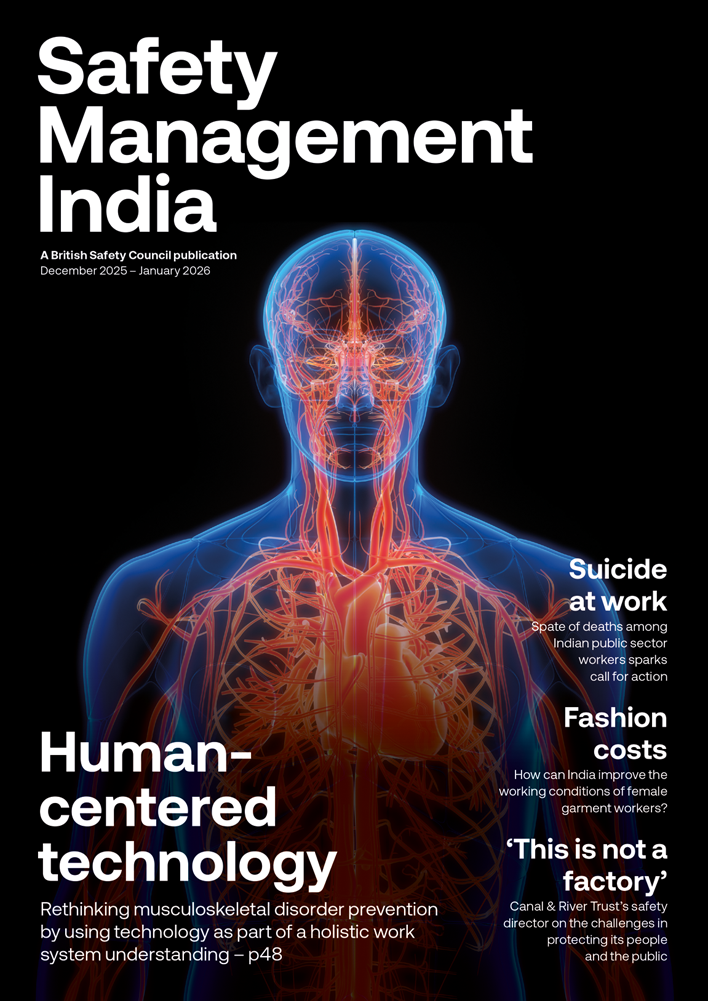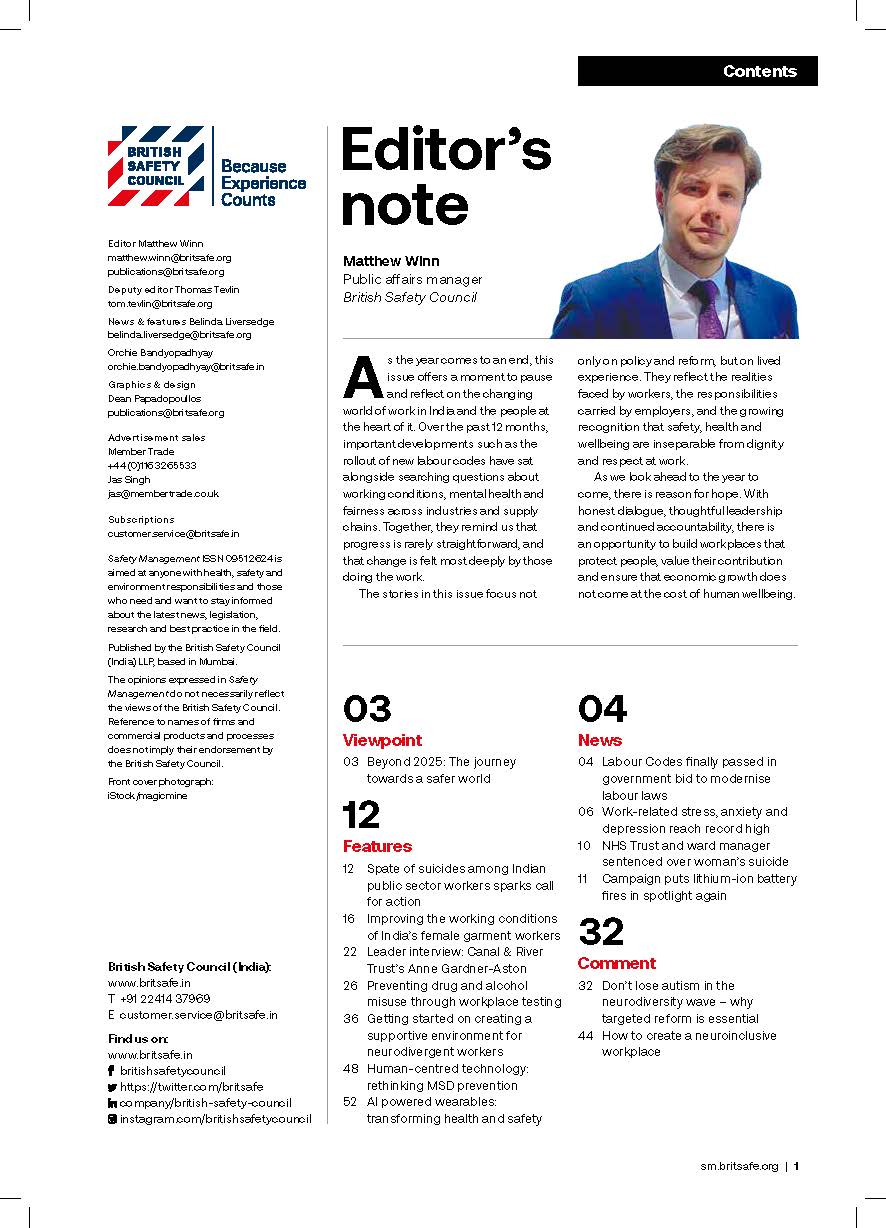There are growing calls for mandatory UKAS accreditation for organisations that offer asbestos surveying services, but there are strong arguments both in favour and against the move.
Features
Mandatory UKAS accreditation for surveying: essential step or unnecessary barrier to creating an asbestos-safe future?
In the wake of ongoing concerns about asbestos exposure and its devastating health impacts, the UK asbestos industry is facing a fundamental question: should UKAS accreditation for asbestos surveying become a mandatory legal requirement? The implications of such a move are far-reaching. On the one hand, it could drive up standards, increase consistency and support long-term public health goals. On the other, it may impose barriers that disproportionately affect smaller firms that offer asbestos management services, reduce market flexibility, and add costs that aren’t necessarily aligned with better outcomes.
This debate is not just theoretical. It directly impacts the way the UK manages one of its most persistent occupational and public health threats. It affects local authorities, NHS Trusts, schools, housing providers, private businesses and, above all, the safety of workers and the public. With strong arguments on both sides, this issue is set to be one of the most hotly contested topics at the upcoming NORAC (National Organisation of Asbestos Consultants) Annual Conference in Manchester on 17 September 2025.
This article examines the core of the debate, exploring the key arguments for and against mandatory UKAS accreditation for asbestos surveying. It also considers the wider implications of each option for an asbestos-safe future in the UK.
 Should UKAS accreditation for asbestos surveying become a mandatory legal requirement? The implications of such a move are far-reaching. Photograph: iStock
Should UKAS accreditation for asbestos surveying become a mandatory legal requirement? The implications of such a move are far-reaching. Photograph: iStock
Understanding UKAS and accreditation in asbestos surveying
UKAS (United Kingdom Accreditation Service) is the sole national accreditation body recognised by the UK government to assess organisations that provide certification, testing, inspection and calibration services. In the asbestos sector, UKAS accredits surveying bodies against ISO/IEC 17020:2012, which outlines requirements for the competence of inspection bodies.
Currently, while many clients prefer or require UKAS-accredited surveyors, accreditation is not a legal requirement under the Control of Asbestos Regulations 2012 (CAR). Regulation 4 of CAR requires the duty holder to ensure that a suitable and sufficient assessment (for example, a survey) is carried out. However, there is no legal stipulation that this must be done by a UKAS-accredited body.
So, should that change?
The case for mandatory UKAS accreditation
Standardisation and consistency
Perhaps the most cited benefit of mandatory accreditation is the guarantee of consistency and technical competency. With UKAS oversight, accredited bodies are subject to regular surveillance and assessment. This includes technical audits, quality management checks and review of competence frameworks.
Supporters argue that this raises the bar across the industry and ensures that every surveyor, regardless of company size or geographic location, meets a minimum professional standard. In a sector plagued by horror stories of poor-quality surveys and hidden asbestos risks, this standardisation could prevent costly remediation work and, more importantly, prevent exposure.
Public confidence and safety
Accreditation would help to reassure the public that the risk posed by asbestos-containing materials (ACMs) is being properly assessed. A mandatory requirement should provide assurance to duty holders and property managers that surveys are accurate, defensible, and compliant.
In high-risk environments such as schools and hospitals, where historical asbestos use is widespread, such confidence could be critical.
Supports legislative and policy alignment
There is an argument that mandatory UKAS accreditation would bring the UK more closely into alignment with best practices seen internationally. It would also strengthen enforcement and allow the HSE (Health and Safety Executive) to take more robust action where unqualified or rogue surveyors operate.
Further, given the UK Government’s continued commitment to safe management of asbestos in public buildings – and growing pressure to set a long-term strategy for phased removal – mandatory accreditation would support this vision.
 Colette Willoughby: "The debate over accreditation is more than a technicality. It is a reflection of our collective ambition to tackle asbestos risk once and for all."
Colette Willoughby: "The debate over accreditation is more than a technicality. It is a reflection of our collective ambition to tackle asbestos risk once and for all."
Reduces conflicts of interest
UKAS-accredited organisations must demonstrate independence and impartiality in their work. Requiring this by law would reduce the risk of conflicts of interest, such as surveyors downplaying the presence of asbestos to reduce client costs or to win removal work themselves. This separation of duties is seen by many as a necessary control measure.
The case against mandatory UKAS accreditation
Disproportionate impact on SMEs
Many critics argue that mandatory accreditation would disproportionately affect small and medium-sized enterprises (SMEs) that offer asbestos surveying services, many of which operate to high standards but are not UKAS accredited due to cost, complexity or business model.
UKAS accreditation can be expensive to obtain and maintain, with annual assessments, documentation burdens and infrastructure costs. For smaller consultancies or sole traders, these costs could be prohibitive.
Some believe this would limit market access, reduce competition and could ultimately drive up costs for end clients – with no clear evidence of a proportional improvement in quality.
Accreditation is not synonymous with competence
A central counter-argument is that UKAS accreditation, while a useful benchmark, does not guarantee competence on its own. The process focuses heavily on systems, documentation and compliance, rather than hands-on surveying skills. The inference is that the surveying organisation authorises its own staff against their accreditation and this is only ‘dip tested’ by UKAS.
There are accredited organisations with poor reputations and non-accredited ones that are trusted and well respected. By focusing solely on accreditation, there is a risk of overlooking actual technical capability.
Risk of bureaucratic overreach
Critics also warn of creeping bureaucracy. If accreditation becomes mandatory, will that extend to reinspection work, consultancy or asbestos removal supervision? There are concerns that an over-reliance on accreditation can create rigid systems that stifle innovation and responsiveness.
Furthermore, some fear that mandatory accreditation could evolve into a de facto monopoly, where UKAS holds disproportionate power and control over the sector without adequate oversight.
Existing regulation already places the duty on the duty holder
The Control of Asbestos Regulations already place legal responsibility on duty holders to ensure that surveys are suitable and sufficient. Many argue this system is effective and proportionate, allowing clients to assess competence using a wider range of criteria than just accreditation status.
Making UKAS accreditation mandatory may create a false sense of security, leading duty holders to outsource judgement rather than exercising due diligence.
The broader context: towards an asbestos-safe future
This debate comes at a critical time. The House of Commons Work and Pensions Select Committee, as well as a number of MPs, trade unions and health advocates, have called for a national asbestos removal programme. There is growing pressure to develop a 40-year roadmap for asbestos eradication, especially in public buildings.
HSE’s current strategy is focused on managing asbestos in place, but many believe this is unsustainable long-term. As buildings age, so do the materials within them. The number of asbestos-related deaths in the UK remains stubbornly high, with over 5,000 per year, including many from mesothelioma, a cancer almost exclusively caused by asbestos.
Against this backdrop, the quality and reliability of asbestos surveying becomes absolutely pivotal. If a phased removal strategy is to work, it must begin with a clear and comprehensive understanding of where asbestos is, what condition it’s in and how it should be prioritised.
This is where accreditation comes in. Proponents argue that mandatory UKAS accreditation would underpin a trusted national inventory of asbestos-containing materials and help avoid the many missteps of the past.
Yet critics urge caution. A blanket requirement for accreditation could reduce the capacity of the surveying workforce at the very time we need to scale it up. It could also create an unnecessary bottleneck, particularly if UKAS or accredited providers struggle to meet increased demand.
 If a phased removal strategy is to work, it must begin with a clear and comprehensive understanding of where asbestos is, what condition it’s in and how it should be prioritised. Photograph: iStock
If a phased removal strategy is to work, it must begin with a clear and comprehensive understanding of where asbestos is, what condition it’s in and how it should be prioritised. Photograph: iStock
Stakeholder perspectives
Local authorities and public sector clients
Many local authorities already specify UKAS-accredited surveyors in their procurement frameworks. For them, mandatory accreditation would simply formalise existing best practice. However, budget constraints remain a real issue, and the impact on cost and tendering options cannot be ignored.
NHS trusts
Healthcare environments present some of the highest risks from poorly managed asbestos.
For many NHS Estates teams, the reassurance of accreditation is valuable. Yet trusts vary widely in how surveys are commissioned and managed. The sector would need clarity, support and capacity-building to ensure compliance.
Industry bodies
NORAC (National Organisation of Asbestos Consultants), ATaC (Asbestos Testing and Consultancy Association), and other industry organisations offer mixed views. While many support accreditation in principle, they highlight the need for flexibility, proportionality and proper consultation. Some advocate for alternative forms of validation, such as certified competence schemes or national registers.
Consultancies and surveyors
Larger consultancies often already hold UKAS accreditation and would likely benefit from a legal mandate. However, for smaller firms, sole traders or specialist providers, the implications could be challenging. Many urge a tiered or phased approach, allowing time and support to transition.
What are the alternatives?
If mandatory UKAS accreditation is not the answer, what might be?
Several alternatives have been proposed:
- Competency-based licensing: a national register of competent asbestos professionals, with entry based on proven qualifications, experience, and references.
- Third-party certification: allowing non-UKAS accredited organisations to demonstrate competence through other recognised frameworks.
- Tiered approach: making UKAS accreditation mandatory only for high-risk or public sector surveys, with flexibility in lower-risk scenarios.
- Improved client guidance: ensuring duty holders understand how to assess surveyor competence and what constitutes a “suitable and sufficient” survey.
These approaches could offer a more nuanced solution, balancing the need for rigour with flexibility and sectoral realities.
Conclusion: an industry at a crossroads
Asbestos remains one of the UK’s most complex and enduring public health challenges. With over 1.5 million buildings still thought to contain ACMs, the role of competent asbestos surveying cannot be overstated.
Whether UKAS accreditation should be a mandatory legal requirement is a question that cuts to the heart of how we ensure safety, professionalism and accountability in the sector. The arguments on both sides are compelling, rooted in real-world experience, economic pragmatism and public health priorities.
As the UK looks to the future, with pressure mounting for a national asbestos removal strategy and better protections for workers and the public, the debate over accreditation is more than a technicality. It is a reflection of our collective ambition to tackle asbestos risk once and for all.
This pivotal debate will take centre stage at the NORAC Annual Conference on 17 September 2025 at the V&A Marriott Hotel in Manchester.
Join leading voices from across the industry as they examine both sides of the issue, challenge assumptions, and explore what it truly means to create an asbestos-safe future for the UK.
Secure your place now and be part of the conversation that could shape national policy and industry standards for years to come. Register here.
Colette Willoughby MA CMIOSH FFAAM AFOH CCP, is a director and asbestos compliance consultant at Asbestos Compliance Limited. She is also chair of the National Organisation of Asbestos Consultants (NORAC):
For more information go to:
asbestos-compliance.co.uk
E. [email protected]
T. +44 (0)330 057 7653
linkedin.com/company/asbestos-compliance-ltd
linkedin.com/in/colette-willoughby-7387561b/
norac.org.uk
FEATURES

The price of fast fashion is not pretty
By Orchie Bandyopadhyay on 11 December 2025
The largely female workforce in India’s garment manufacturing industry faces long hours, low wages and poor working conditions, and campaigners say it is time the Indian government and international clothing brands took tougher action to improve working conditions, pay and employment rights.

Suicide at work: a major problem in India
By Orchie Bandyopadhyay on 11 December 2025
Recent reports of suicides among workers ranging from police officers to electoral roll officials have prompted calls for employers and government agencies to do more to both reduce excessive workloads and provide better mental health support at work.



